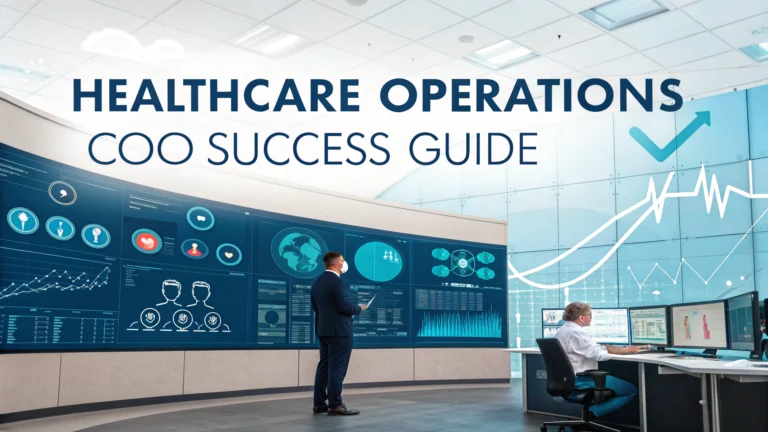The role of Chief Operating Officer in healthcare organizations requires a unique blend of clinical understanding, operational expertise, and strategic leadership skills.
Healthcare COOs must navigate complex regulatory environments while maintaining quality patient care and managing diverse teams of medical professionals, administrators, and support staff.
This guide outlines practical strategies and essential skills for healthcare COOs to drive operational excellence and organizational growth.
Key Responsibilities of Healthcare COOs
- Overseeing daily operations across all facilities
- Managing budgets and resource allocation
- Ensuring regulatory compliance and accreditation
- Developing and implementing operational policies
- Coordinating with medical staff and department heads
Essential Skills for Success
Leadership Abilities: Direct large, diverse teams while maintaining clear communication channels.
Financial Acumen: Understand healthcare economics, revenue cycle management, and budget optimization.
Technical Knowledge: Stay current with healthcare technology, EMR systems, and digital transformation.
Operational Excellence Strategies
- Implement lean management principles in clinical settings
- Develop metrics-driven performance monitoring systems
- Create efficient patient flow processes
- Optimize staff scheduling and resource utilization
- Establish quality improvement programs
Building Effective Teams
| Area | Action Items |
|---|---|
| Clinical Staff | Regular department head meetings, clear performance metrics |
| Administrative Team | Cross-training programs, career development paths |
| Support Services | Regular feedback sessions, process improvement initiatives |
Technology Integration
Select and implement appropriate healthcare management systems that align with organizational goals.
Ensure seamless integration between clinical and administrative systems.
Maintain robust cybersecurity measures to protect patient data.
Quality and Compliance
- Establish clear quality metrics and monitoring systems
- Maintain Joint Commission accreditation standards
- Ensure HIPAA compliance across all operations
- Develop risk management protocols
Financial Management Tips
Cost Control: Implement evidence-based protocols to reduce waste and improve efficiency.
Revenue Enhancement: Optimize billing processes and payer contract negotiations.
Investment Planning: Prioritize capital expenditures based on ROI and strategic alignment.
Professional Development Resources
- American College of Healthcare Executives (ACHE) – www.ache.org
- Healthcare Financial Management Association (HFMA) – www.hfma.org
- Medical Group Management Association (MGMA) – www.mgma.com
Moving Forward as a Healthcare COO
Focus on building strong relationships with medical staff, board members, and community stakeholders.
Stay informed about healthcare policy changes and industry trends through continuous education and networking.
Maintain a balanced approach between operational efficiency and quality patient care.
Strategic Planning and Innovation
- Develop long-term growth strategies
- Identify market opportunities and competitive advantages
- Foster innovation in service delivery models
- Create sustainable expansion plans
Crisis Management and Emergency Preparedness
Emergency Response: Develop and maintain comprehensive emergency response protocols.
Business Continuity: Ensure critical operations continue during disruptions.
Communication Plans: Establish clear channels for crisis communication.
Community Relations and Partnerships
- Build relationships with local healthcare providers
- Engage in community health initiatives
- Develop strategic partnerships with academic institutions
- Maintain positive relationships with regulatory bodies
Performance Metrics and Analytics
| Category | Key Performance Indicators |
|---|---|
| Clinical Excellence | Patient outcomes, readmission rates, infection rates |
| Operational Efficiency | Length of stay, resource utilization, throughput metrics |
| Financial Health | Operating margins, revenue cycle metrics, cost per case |
Driving Healthcare Excellence Through Leadership
Success as a healthcare COO requires a commitment to continuous improvement, adaptability to change, and unwavering focus on patient care quality.
Prioritize the development of robust systems that support both operational efficiency and clinical excellence.
Remember that effective leadership in healthcare means balancing financial sustainability with the organization’s mission to serve the community and improve health outcomes.
FAQs
- What are the primary responsibilities of a Healthcare COO?
A Healthcare COO oversees daily operations, manages facility resources, ensures regulatory compliance, coordinates departments, implements strategic initiatives, maintains quality standards, and optimizes operational efficiency while supporting the CEO’s vision. - What qualifications are typically required for a Healthcare COO position?
A master’s degree in Healthcare Administration, Business Administration, or related field, 10+ years of healthcare management experience, strong leadership skills, and thorough understanding of healthcare regulations and operations. - How does a Healthcare COO manage quality metrics and performance improvement?
By implementing data-driven performance tracking systems, monitoring patient satisfaction scores, analyzing operational KPIs, ensuring Joint Commission compliance, and developing continuous improvement initiatives across departments. - What role does the COO play in healthcare cost management?
The COO manages operating budgets, identifies cost-saving opportunities, optimizes resource allocation, negotiates vendor contracts, implements efficient staffing models, and ensures financial sustainability while maintaining quality care. - How does a Healthcare COO ensure regulatory compliance?
Through maintaining accreditation standards, implementing compliance programs, overseeing policy development, conducting regular audits, managing risk assessments, and staying current with healthcare regulations and requirements. - What technology systems should a Healthcare COO be familiar with?
Electronic Health Records (EHR) systems, healthcare management software, financial management systems, scheduling platforms, quality reporting tools, and data analytics platforms. - How does a Healthcare COO handle staffing and workforce management?
By developing staffing models, overseeing recruitment strategies, implementing retention programs, managing labor relations, ensuring proper credentialing, and coordinating staff development initiatives. - What strategies do successful Healthcare COOs use for patient experience improvement?
Implementing patient feedback systems, developing service excellence programs, streamlining patient flow processes, enhancing communication protocols, and creating patient-centered care initiatives. - How does a Healthcare COO manage relationships with physicians and medical staff?
Through regular communication channels, collaborative decision-making processes, addressing clinical needs, supporting medical staff operations, and aligning organizational goals with clinical objectives. - What is the COO’s role in emergency preparedness and crisis management?
Developing and maintaining emergency response plans, coordinating disaster preparedness, ensuring business continuity, managing crisis communication, and leading emergency response teams.








